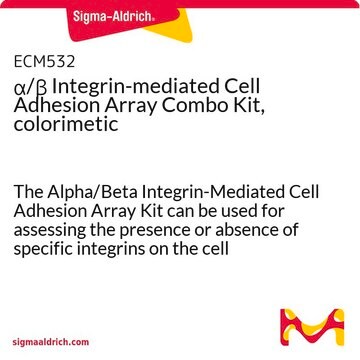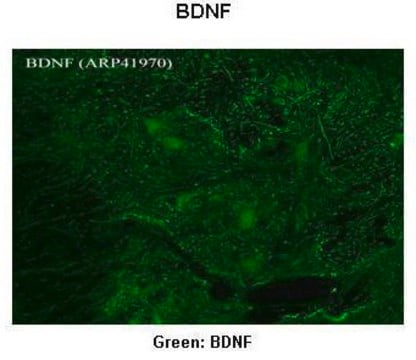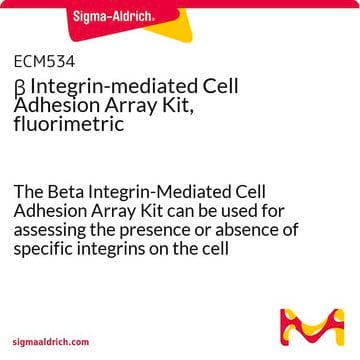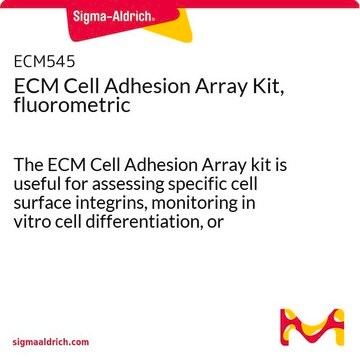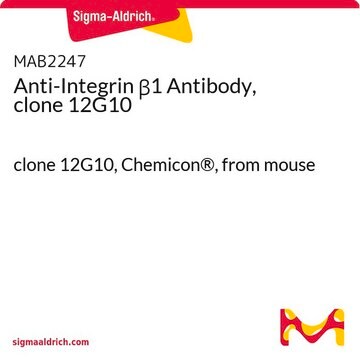ECM535
α/β Integrin-mediated Cell Adhesion Array Combo Kit, fluorimetric
The Alpha/Beta Integrin-Mediated Cell Adhesion Array Kit can be used for assessing the presence or absence of specific integrins on the cell surface.
Synonyma:
Alpha/beta integrin cell adhesion kit
Přihlásitk zobrazení cen stanovených pro organizaci a smluvních cen
About This Item
UNSPSC Code:
12352207
eCl@ss:
32161000
NACRES:
NA.32
Doporučené produkty
Quality Level
species reactivity
human
manufacturer/tradename
Chemicon®
technique(s)
cell based assay: suitable
NCBI accession no.
detection method
fluorometric
shipped in
wet ice
Gene Information
human ... ITGA1(3672)
Application
Research Category
Cell Structure
Cell Structure
The Alpha/Beta Integrin-Mediated Cell Adhesion Array Kit can be used for assessing the presence or absence of specific integrins on the cell surface.
The CHEMICON® Alpha/Beta Integrin-Mediated Cell Adhesion Array Kit can be used for assessing the presence or absence of specific integrins on the cell surface. This assay can substitute for FACS analysis (6) and is useful for screening human adherent cells for cell surface integrins or for monitoring in vitro cell differentiation or genetic modification of cells.
For Research Use Only. Not for use in diagnostic procedures.
For Research Use Only. Not for use in diagnostic procedures.
Packaging
96 wells each
Components
Alpha Integrin Array Plate: (PN: 90599) One 96-well plate with 12 strips. Each strip contains one well each of the mouse anti-alpha integrin monoclonal antibodies: (alpha1, alpha2, alpha3, alpha4, alpha5, alphaV, alphavbeta3), and one goat anti-mouse negative well. See the Alpha Integrin plate layout on the insert data sheet.
Beta Integrin Array Plate: (PN: 90600) One 96-well plate with 12 strips. Each strip contains one well each of the mouse anti-beta integrin monoclonal antibodies: (beta1, beta2, beta3, beta4, beta6, alphaVbeta5, and alpha5beta1), and one goat anti-mouse negative well. See the Beta Integrin plate layout on the insert data sheet.
4X Cell Lysis Buffer: (Part No. 90130) One bottle - 16 mL
CyQuant GR Dye: (Part No. 90132) Two vials - 75 μL each
Assay Buffer: (Part No. 90601) Two bottles - 100 mL each
Beta Integrin Array Plate: (PN: 90600) One 96-well plate with 12 strips. Each strip contains one well each of the mouse anti-beta integrin monoclonal antibodies: (beta1, beta2, beta3, beta4, beta6, alphaVbeta5, and alpha5beta1), and one goat anti-mouse negative well. See the Beta Integrin plate layout on the insert data sheet.
4X Cell Lysis Buffer: (Part No. 90130) One bottle - 16 mL
CyQuant GR Dye: (Part No. 90132) Two vials - 75 μL each
Assay Buffer: (Part No. 90601) Two bottles - 100 mL each
Storage and Stability
The Alpha and Beta Integrin Array Plates can be stored at 2° to 8°C in the foil pouch up to their expiration date. Unused strips may be placed back in the pouch for storage. Ensure that the desiccant remains in the pouch, and that the pouch is securely closed. Keep the remaining kit components at 2° to 8°C.
Precautions
No data is available on the biological toxicity of CyQuant GR™ dye. This reagent binds to nucleic acids, and as such, should be treated as a potential mutagen which may cause cancer and heritable genetic damage. Handle with caution. The DMSO stock solution should be handled with special caution as DMSO can facilitate the entry of organic molecules into tissues.
Precautions
No data is available on the biological toxicity of CyQuant GR™ dye. This reagent binds to nucleic acids, and as such, should be treated as a potential mutagen which may cause cancer and heritable genetic damage. Handle with caution. The DMSO stock solution should be handled with special caution as DMSO can facilitate the entry of organic molecules into tissues.
Legal Information
CHEMICON is a registered trademark of Merck KGaA, Darmstadt, Germany
GR is a trademark of Sigma-Aldrich Co. LLC
Disclaimer
Unless otherwise stated in our catalog or other company documentation accompanying the product(s), our products are intended for research use only and are not to be used for any other purpose, which includes but is not limited to, unauthorized commercial uses, in vitro diagnostic uses, ex vivo or in vivo therapeutic uses or any type of consumption or application to humans or animals.
signalword
Danger
hcodes
Hazard Classifications
Aquatic Acute 1 - Aquatic Chronic 2 - Eye Dam. 1
Storage Class
10 - Combustible liquids
Osvědčení o analýze (COA)
Vyhledejte osvědčení Osvědčení o analýze (COA) zadáním čísla šarže/dávky těchto produktů. Čísla šarže a dávky lze nalézt na štítku produktu za slovy „Lot“ nebo „Batch“.
Již tento produkt vlastníte?
Dokumenty související s produkty, které jste v minulosti zakoupili, byly za účelem usnadnění shromážděny ve vaší Knihovně dokumentů.
P G Dedes et al.
Biochimica et biophysica acta, 1820(12), 1926-1939 (2012-08-14)
The extracellular matrix (ECM) components play key roles in the multistep process of cancer growth and progression. Preclinical and clinical data show that bisphosphonates (BPs) may exert direct or indirect antitumoral effects. Despite proven efficiency in cancer treatment, the mechanism
Náš tým vědeckých pracovníků má zkušenosti ve všech oblastech výzkumu, včetně přírodních věd, materiálových věd, chemické syntézy, chromatografie, analytiky a mnoha dalších..
Obraťte se na technický servis.